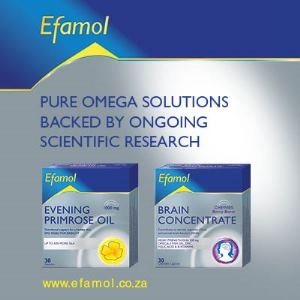
Topics: Evening primrose oil (EPO), omega-6 fatty acids, gamma-linolenic acid (GLA), atopic eczema, atopic dermatitis (AD), skin, delta-6-desaturase (D-6-D)
Objective: To determine whether EPO supplementation results in an increase in plasma GLA and its metabolite dihomo-gamma-linolenic acid (DGLA) correlate with clinical improvement of AD, assessed by the SCORing Atopic Dermatitis (SCORAD) index.
Background: Synthesis of the long chain omega-6 fatty acids involves alternating steps of desaturation and elongation with serial conversion of linoleic acid (LA) to GLA, dihommogammalinolenic acid (DGLA) and arachidonic acid (AA).
Over twenty years ago, scientists at the Efamol Research Institute found that blood levels of LA were higher and all its metabolites were lower than normal in people with atopic eczema; a condition where skin barrier function is compromised resulting in increased trans epidermal water loss (TEWL) and epidermal hyper-proliferation.
They proposed there was a defect in an enzyme called delta-6-desaturase (D-6-D) that normally converts LA to GLA that contributed to the development of atopic eczema and that supplementation with EPO, thereby providing a direct dietary source of GLA, would improve skin health.
Few recent studies have investigated the association between increases GLA and DGLA status and symptom improvement following EPO supplementation. However, today the cause of atopic eczema is recognized to be multifactorial including a genetic predisposition towards disrupted skin barrier function, allergic inflammation and environmental factors. At least in a subset of patients with AD, a malfunction of D-6-D seems to play a role.
Method: This prospective, explorative, multi-centered, open study included 21 patients between 3-58 years with AD. Patients were supplemented with 4-6 capsules of EPOGAM (EPO) containing 80 mg of GLA per 1000 mg capsule daily for 12 weeks.
Inclusion Criteria: AD as defined by criteria of Hanifin and Rajka with predominant tough and fissured skin and pruritis for t least 2 months.
Exclusion Criteria: Pregnant or lactating women, presence of chronic dermatosis such as seborrheic dermatitis, contact dermatitis, nummular eczema, psoriasis, ichthyosis, an immune-deficiency or any immunological disorder, scabies, cutaneous fungal infection, HIV-associated skin disorders, malignant diseases, T cell-Lymphoma, Letter-Siwe disease, progressive systemic disease, serious internal diseases of the heart, liver, and/or kidneys, or diabetes, hypersensitivity towards one of the ingredients in the investigational medication, and those taking part in other studies or who have taken an investigational product during the last 4 weeks.
Additional Criteria: Participants were allowed to continue use of medications which they were taking prior to the study at the same dose, unless the medication could be discontinued or was listed as prohibited medication.
Prohibited medications were as follows:
• 30 days prior to the study start: physical or psychological therapy, antiinflammatory medication to treat AD and immune-modulating medications
• 14 days prior to the study:non-steroidal anti-rheumatic drugs, systemic use of glucocorticosteroids, tansquillizers or antiemetic agents from the phenothiazine group
• 7 days prior to start of the study:alpha- of beta-blockers, clonidine, alphasympathominmetic medications, azelastine,levocabastine or antidepressants
Assessments before and after 4 and 12 weeks of treatment:
1. SCORAD – to measure symptoms of AD including redness, swelling, itching, weeping/crusting, excoriation, lichenification, dryness and total intensity
2. Plasma fatty acid concentration
3. Adverse events
4. Hematological and clinical-chemical laboratory tests and vital signs
Findings:
A significant increase in plasma GLA and DGLA levels and a decrease in the objective SCORAD were observed 4 and 12 weeks after initiation of EPO treatment. In the perprotocol population (n = 14), a significant inverse correlation between the changes in plasma GLA levels and SCORAD was found (P = 0.008). The mean total SCORAD showed a time-dependent reduction with a statistically significant decrease after 4 weeks (P=0.019) and 12 weeks (p=0.001).
At baseline, 42.9% of the patients had mild symptoms and 57.1 % had moderate symptoms. After 12 weeks treatment, 93.2% of the patients had mild symptoms, whereas only 6.8% had moderate symptoms. The concomitant use of other medications had no effect on the objective SCORAD when comparing the group that used other anti-AD medications and those that did not. There were no serious side effects. Minor ones included tiredness, impaired concentration, diarrhoea, abdominal cramps and pruritis.
Conclusion:
EPO improves symptoms of atopic eczema while increasing blood levels of GLA and DGLA. In addition, clinical improvements in disease activity under EPO treatment correlate with individual increases in plasma GLA levels indicating that GLA may be responsible for the improvement and that GLA could be used as a marker to identify responders.
Thus, patients without an increase in plasma GLA after 4 weeks would be regarded as non-responders and could be recommended to stop therapy while those that did have increased GLA levels could proceed and expect to achieve successful treatment. Lastly, the further improvements measured as 12 weeks support the idea that EPO should be used as a long-term therapy.
Relevance to: Efamol Evening Primrose Oil
Reference:
Gamma-Linolenic Acid Levels Simon D, Eng PA, Borelli S, Kägi R, Zimmermann C, Zahner C, Drewe J, Hess L, Ferrari G, Lautenschlager S, Wüthrich B, SchmidGrendelmeier P.Correlate with Clinical Efficacy of Evening Primrose Oil in Patients with Atopic Dermatitis. Adv Ther. 2014 Jan 17.




 Publications
Publications
 Partners
Partners










